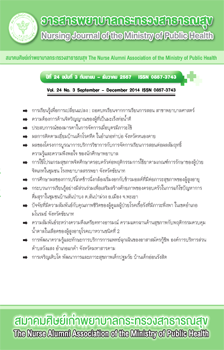กระบวนการเรียนรู้อย่างมีส่วนร่วมเพื่อเสริมสร้างศักยภาพของครอบครัวในการแก้ไขปัญหาการดื่มสุรา,Participatory Learning Process to Build Capacity of Families in Solving Alcohol Problems in Ban Sanpabong, Sanpamuang Sub-district, Muang district, Phayao Province
Main Article Content
Abstract
กระบวนการเรียนรู้อย่างมีส่วนร่วมเพื่อเสริมสร้างศักยภาพของครอบครัวในการแก้ไขปัญหาการดื่มสุราในชุมชนบ้านสันป่าบง ต.สันป่าม่วง อ.เมือง จ.พะเยา
สุภาพรณ์ อุดมลักษณ์* ปัณณธร ชัชวรัตน์** จันทร์จิรา อีนจีน***
บทคัดย่อ
การวิจัยเชิงปฏิบัตการแบบมีส่วนร่วม (Participatory Action Research: PAR) มีวัตถุประสงค์ที่สำคัญ 2 ประการ คือ 1) เพื่อศึกษาสภาพการณ์การดื่มสุราของประชาชนในชุมชนและ 2) เพื่อสร้างกระบวนการเรียนรู้แบบมีส่วนร่วมเพื่อเสริมสร้างศักยภาพของครอบครัว ในการแก้ไขปัญหาการด่มื สุราในชุมชน วิธีดำเนินการ ประกอบด้วย 1) การประเมินสถานการณ์การดี่มสุราของประชาชนในชุมชน 2) การกำหนดและจัดลำดับความสำคัญของปัญหาการที่มีสมาชิกในครอบครัวดื่มสุรา 3) กำหนดทางเลือกแนวทางการแก้ไขปัญหาการดื่มสุรา 4) การปฏิบัติการแก้ไขปัญหาการดื่มสุรา และ 5) ประเมินผลกระบวนการเรียนรู้แบบมีส่วนร่วมเพื่อเสริมสร้างศักยภาพของครอบครัว ในการแก้ไขปัญหาการดื่มสุราในชุมชนกลุ่มเป้าหมายเป็น บุคคลที่อาศัยอยู่ใน หมู่ที่ 6 ต. สันป่าม่วง อ.เมือง จ.พะเยา ผลการศึกษา พบว่า ในช่วง 6 เดือนที่ผ่านมามีการดื่มเครื่องดื่มที่มีแอลกอฮอล์ร้อยละ 89.7 และผู้ดื่มรู้ว่าการดื่มเครื่องดื่มแอลกอฮอล์ มีโทษต่อร่างกายทั้งผลที่มีต่อสุขภาพและการเกิดอุบัติเหตุ ในการสร้างกระบวนการเรียนรู้แบบมีส่วนร่วม ในการแก้ไขปัญ หาการดื่มสุราในชุมชน ผลปรากฏว่า พฤติกรรมการดื่มสุราภายในครอบครัวเริ่มต้นการดื่มเครื่องดื่มแอลกอฮอร์ตั้งแต่วัยรุ่นหญิงชาย โดยซึมซับจากครอบครัว กลุ่มเพื่อนและสังคม เหตุผลหลัก คือ อยากลอง และดื่มในงานสังสรรค์ ชนิดของเครื่องดื่มแอลกอฮอร์ที่นิยมรับประทาน ได้แก่ เหล้าเถื่อน สุรา และเบียร์ และไวน์ พฤติกรรมการดื่ม สุราในชีวิตประจำวัน พบว่า วัยแรงงานทั้งเพศหญิง เพศชาย จะดื่มเป็นประจำ หลังจากทำงานตอนเย็น งานสังสรรค์และเทศกาลต่างๆ ส่วนการจัดลำดับความสำคัญของปัญหาการดื่มเครื่องดื่มที่มีแอลกอฮอร์ ประกอบด้วย ปัญหาด้านสุขภาพ ปัญหาด้านครอบครัวและปัญหาด้านสังคม และมีแนวทางการแก้ปัญหาการดื่มสุรา ประกอบด้วย การสร้างความตระหนักในภาวะสุขภาพของผู้ดื่มสุรา และผลเสียจากการดื่มสุราโดยสมาชิกในครอบครัว สมาชิกในชุมชน และจากบุคลากรสาธารณสุข สำหรับประเมินผลกระบวนการเรียนรู้แบบมีส่วนร่วมพบว่ามีการเปลี่ยนแปลงพฤติกรรมการดื่มในระดับครอบครัวของผู้ดื่มมีความเข้าใจและพูดคุยกันมากขึ้น และในระดับชุมชนเกิดมาตรการของชุมชน เรื่องลดละเลิกสุราคืองานศพปลอดเหล้าอย่างแท้จริง ผู้เข้าร่วมกิจกรรม งดเหล้าเข้าพรรษาเพิ่มขึ้นและกำลังจะดำเนินรณรงค์เรื่อง อย่าผิดศีลในงานบุญ นอกจากนี้ยังมีการกำหนดแนวทางการแก้ปัญหาการดื่มสุราของครอบครัวและชุมชน ประกอบด้วย การจัดตั้งแกนนำรณรงค์การดื่มเหล้าด้วยการจัดทำป้ายรณรงค์ให้รู้โทษและโรคที่กิดขึ้นจากการดื่มสุรา ไว้ที่ศาลาประชาคม ทางแยกของหมู่บ้าน การจัดทำโครงการงดเหล้าเข้าพรรษา การจัดตั้งกลุ่มงดเหล้าในชุมชน และ ขอมติในชุมชนในการงดเหล้าเพื่อพระพุทธศาสนา เพื่องดเหล้าในงานบุญต่างๆ เพื่อไม่ให้เป็นการผิดศีลของพระพุทธศาสนา ผลการวิจัยแสดงให้เห็นว่า การแก้ไขปัญหาสุราหากเนน้ การมีส่วนร่วมของชุมชน โดยคำนึงถึงทุนทางสังคมของแต่ละชุมชน และเริ่มต้นแนวทางจากสิ่งที่มีอยู่แล้วในชุมชนและต่อยอดจากสิ่งที่ชุมชนได้มีการดำเนินการ ก็จะสามารถแก้ไขปัญหาการดื่มสุราได้อย่างยั่งยืน
คำสำคัญ : การดื่มสุรา การแก้ไขปัญหาการด่มื สุรา กระบวนการเรียนรู้อย่างมีส่วนร่วม
*ผู้อำนวยการ วิทยาลัยพยาบาลบรมราชชนนี พะเยา
**หัวหน้างานวิจัย วิทยาลัยพยาบาลบรมราชชนนี พะเยา
**อาจารย์ วิทยาลัยพยาบาลบรมราชชนนี พะเยา
Participatory Learning Process to Build Capacity of Families in Solving Alcohol Problems in Ban Sanpabong, Sanpamuang Sub-district, Muang district, Phayao Province
Suphaphon Udomluck* Pannathorn Chachvarat** Junjira Eanjen***
Abstract
This Participatory Action Research (PAR) study was conducted assess the drinking situation among people in a community and promote participatory learning in order to empower families to solve alcohol problems in a community. There were 5 steps to the research process: 1) assess the drinking pattern among villagers; 2) set priorities regarding drinking problems; 3) identify the problem solving method of drinking problems; 4) implement the measures for solving drinking problems; and 5) evaluate the result of participatory learning for empowering families in order to resolve drinking problems. Participants were villagers who resided in Moo 6, Sunpamuang sub district, Muang district, Phayao province, and voluntarily participated in this research. Findings revealed that 89.7% of participants consumed alcohol over the last six months. Drinkers knew that alcohol resulted health effects and caused accidents. Family members who participated in the process of participatory learning reported that they had started drinking as teenagers. The cause of drinking was attributed to a culture of drinking among family members, peers and communities. The main reason for drinking was social drinking. The types of alcohol beverage preferred include local brews, spirits, beer and wine. Most of them drank in the evening after finishing working because the villagers always gave them food and white spirit as a reward after working. Participants set the priority of alcohol problems, which consisted of health problems, family problems and social problems. Participants provided the guidelines to solve alcohol problems as follows: promoting concern of health consequences among drinkers, promoting concern of the negative effects of alcohol by family members, community members and health workers. After implementation, according to the plan for the resolution of alcohol problems, there were 3 levels of positive impacts 1) drinkers: drinkers reported the reduction of alcohol consumption, 2) family: family members and drinkers had a chance to discuss alcohol problems, and 3) community: there was a community policy for reducing alcohol drinking such as no drinking at funerals and no drinking during making merit activities. Also there was an increase in alcohol abstinence during the Buddhist Lent. In addition, there was a leading group working towards reduction of alcohol consumption in the community, including activities such as providing villagers alcohol knowledge, promoting abstinence during the Buddhist Lent, and setting the abstinence groups in the community. Research suggests that the achievement of the alcohol problem solving in community should mainly focus on community participation and empowerment which has led to the sustainability of the alcohol project.
Keywords : drinking problems, solution of alcohol problems, participatory learning
* Director, Boromarajonnani College of Nursing, Phayao
** Director of research affair Boromarajonnani College of Nursing, Phayao
*** Nursing Instructor Boromarajonnani College of Nursing, Phayao
Article Details
บทความและรายงานวิจัยในวารสารพยาบาลกระทรวงสาธารณสุข เป็นความคิดเห็นของ ผู้เขียน มิใช่ของคณะผู้จัดทำ และมิใช่ความรับผิดชอบของสมาคมศิษย์เก่าพยาบาลกระทรวงสาธารณสุข ซึ่งสามารถนำไปอ้างอิงได้

